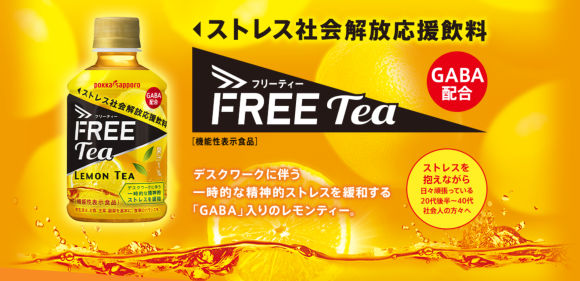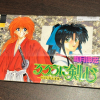It’s often said that freedom isn’t free. In Japan, Free Tea isn’t either.
As we’ve seen before, you can’t always take Japan’s English signage and labeling at face-value. When Engrish rears its head, the results often end up as a mix of baffling and comical, but Twitter user @domoboku recently witnessed some odd use of the English language touch off a fierce argument inside a Japanese convenience store.
@domoboku, who’s Japanese himself, stepped into the store in the afternoon when a non-Japanese Asian had been openly drinking from a bottle of tea he’d grabbed from the shelf without paying for it. Engaged in a heated verbal disagreement with the store clerk, the Asian man shouted “What did I do that was wrong?”
Curious as to what room there could be for debate in what seemed like a clear-cut case of shoplifting, @domoboku took a look at the exact type of tea the man had been helping himself too, and suddenly understood what had caused the misunderstanding.
アジア系の外国人が白昼堂々ドリンクを万引きにしててコンビニ騒然。店員と喧嘩。「何がいけないんだ」と叫ぶ外国人。
— どーも僕です。(どもぼく) (@domoboku) October 28, 2016
様子が変だから間に入って事情を聞いた。
そしたら彼もコンビニも悪くなかった。悪いのはデザインだ。 pic.twitter.com/KAC2PGKlDQ
Splashed across the bottle’s label in large, English text were the words Free Tea, identifying this as a brand produced and distributed by Japanese beverage company Pokka Sapporo.
So how did the drink end up with this unorthodox name? Well, its big selling point is that it contains GABA extract. Pokka Sapporo claims that this gives the tea relaxing properties, and bills Free Tea as “The beverage encouraging that people be free from a stress-filled society,” using the Japanese word kaihou (meaning “free/liberate” and written 解放 in kanji characters) in its advertising.
Unfortunately, in English simply tossing the word “free” in front of an inanimate object generally implies not that it’s liberated, but that it’s complimentary. “It’s written right there on the label, so let me have it!” the man insisted. After an explanation that “Free Tea” was simply the brand name, he changed his stance to “Then the store should change the label!”
外国人もしばらく「書いてあるんだからよこせ」的な論調で、アホな表記を丁寧に説明したら「よこせないなら、せめて表記を変えろ」と。
— どーも僕です。(どもぼく) (@domoboku) October 28, 2016
店員も仕入れた商品に書いてあるだけだから訂正しようもないし万引き未遂されるし、双方被害者という構図。
二人とも振り上げた拳のやり場が無くて気まずかった。
Of course, as @domoboku points out, the store really isn’t in a position, or even legally allowed, to go changing product labels on items its bought from a distributor. “This tea ended up causing a stressful problem for both a traveler who came all the way to Japan and an honest shopkeeper,” he mused. “How ironic that it’s supposed to be ‘The beverage encouraging that people be free from a stress-filled society.’”
わざわざ日本に来てくれた観光客と善良な店員を、ストレスまみれの抗争状態に追い込んだ商品。
— どーも僕です。(どもぼく) (@domoboku) October 28, 2016
そのキャッチコピーが「ストレス社会解放応援飲料」である皮肉。 pic.twitter.com/nvVk6CQhQU
Language barriers and Engrish aside, though, the slot the bottles of Free Tea occupy on the shelf is pretty clearly marked with a price of 130 yen (US$1.26), so the customer might want to pay a little more attention to his surroundings in the future. After all, convenience stores aren’t generally too keen on customers just helping themselves to a refreshing drink without paying, unless maybe said customer is the Dalai Lama.
Source: Jin, Twitter/@domoboku
Insert images: Pokka Sapporo


 Why Does Engrish Happen in Japan? Moon ultra parking edition
Why Does Engrish Happen in Japan? Moon ultra parking edition Why does Engrish happen in Japan?
Why does Engrish happen in Japan? Why Does Engrish Happen in Japan? – Breakfast buffet edition
Why Does Engrish Happen in Japan? – Breakfast buffet edition Why Does Engrish Happen in Japan? 30-year-old fart-related signage mistake edition
Why Does Engrish Happen in Japan? 30-year-old fart-related signage mistake edition We revisited Sweets Paradise after a decade to see if Japan’s dessert buffet still delivers
We revisited Sweets Paradise after a decade to see if Japan’s dessert buffet still delivers Starbucks Japan ready to get Year of the Horse started with adorable drinkware and plushies【Pics】
Starbucks Japan ready to get Year of the Horse started with adorable drinkware and plushies【Pics】 Creator of Rurouni Kenshin anime/manga admits to possession of child pornography
Creator of Rurouni Kenshin anime/manga admits to possession of child pornography Miss World Japan: The great-times-20-granddaughter of samurai lord One-Eyed Dragon
Miss World Japan: The great-times-20-granddaughter of samurai lord One-Eyed Dragon Six uniquely Osaka experiences
Six uniquely Osaka experiences This ad for Ueno Clinic makes no sense… until you realize what the clinic specializes in【Video】
This ad for Ueno Clinic makes no sense… until you realize what the clinic specializes in【Video】 Uniqlo Ukiyo-e Blue T-shirts: A cool-hued reinterpretation of some of Japan’s greatest paintings
Uniqlo Ukiyo-e Blue T-shirts: A cool-hued reinterpretation of some of Japan’s greatest paintings Japanese group to hold fashion show of colostomy bags and other stoma equipment in Paris
Japanese group to hold fashion show of colostomy bags and other stoma equipment in Paris The etiquette rules for visiting Shinto shrines in Japan
The etiquette rules for visiting Shinto shrines in Japan Family Mart releases a fukubukuro lucky bag packed with cool Convenience Wear
Family Mart releases a fukubukuro lucky bag packed with cool Convenience Wear 7-Eleven Japan’s ramen-cooking robot whipped us up a bowl of noodles【Taste test】
7-Eleven Japan’s ramen-cooking robot whipped us up a bowl of noodles【Taste test】 Cyberpunk anime meets traditional culture in Ghost in the Shell gold leaf Japanese changing screens
Cyberpunk anime meets traditional culture in Ghost in the Shell gold leaf Japanese changing screens 7 great places to see Mt. Fuji from without having to climb it
7 great places to see Mt. Fuji from without having to climb it Hello Kitty Choco Egg figures are an adorable trip through three periods of Japanese pop culture【Pics】
Hello Kitty Choco Egg figures are an adorable trip through three periods of Japanese pop culture【Pics】 Japan’s otoshidama tradition of giving kids money at New Year’s gets a social welfare upgrade
Japan’s otoshidama tradition of giving kids money at New Year’s gets a social welfare upgrade We found possibly the quietest Japanese-style hotel in Tokyo’s bustling Shinjuku district
We found possibly the quietest Japanese-style hotel in Tokyo’s bustling Shinjuku district Lacquerware supplier to emperor of Japan and Pokémon team up for new tableware
Lacquerware supplier to emperor of Japan and Pokémon team up for new tableware Sumo Sanrio! Hello Kitty and pals team up with Japan Sumo Association for new merch【Pics】
Sumo Sanrio! Hello Kitty and pals team up with Japan Sumo Association for new merch【Pics】 Can a dirty butthole make you filthy rich in Japan? We’re starting a New Year’s lottery experiment
Can a dirty butthole make you filthy rich in Japan? We’re starting a New Year’s lottery experiment 7-Eleven Japan starts new temporary luggage storage service in over 300 branches
7-Eleven Japan starts new temporary luggage storage service in over 300 branches Disillusionment at Tsukiji’s tourist-target prices led us to a great ramen restaurant in Tokyo
Disillusionment at Tsukiji’s tourist-target prices led us to a great ramen restaurant in Tokyo Starbucks teams up with 166-year-old Kyoto doll maker for Year of the Horse decorations【Photos】
Starbucks teams up with 166-year-old Kyoto doll maker for Year of the Horse decorations【Photos】 Tokyo considering law requiring more trash cans following litter increase in heavily touristed area
Tokyo considering law requiring more trash cans following litter increase in heavily touristed area Tokyo’s Tsukiji sushi neighborhood asks tour groups to stay away for the rest of the month
Tokyo’s Tsukiji sushi neighborhood asks tour groups to stay away for the rest of the month Nintendo’s Kirby now delivering orders at Kura Sushi restaurants, but not in Japan
Nintendo’s Kirby now delivering orders at Kura Sushi restaurants, but not in Japan Tokyo event lets you travel back in time, for free, to celebrate 100 years since Showa era start
Tokyo event lets you travel back in time, for free, to celebrate 100 years since Showa era start Sanrio theme park in Japan announces plans to expand into a Sanrio resort
Sanrio theme park in Japan announces plans to expand into a Sanrio resort Japan may add Japanese language proficiency, lifestyle classes to permanent foreign resident requirements
Japan may add Japanese language proficiency, lifestyle classes to permanent foreign resident requirements Survey asks foreign tourists what bothered them in Japan, more than half gave same answer
Survey asks foreign tourists what bothered them in Japan, more than half gave same answer Japan’s human washing machines will go on sale to general public, demos to be held in Tokyo
Japan’s human washing machines will go on sale to general public, demos to be held in Tokyo Japan’s deadliest food claims more victims, but why do people keep eating it for New Year’s?
Japan’s deadliest food claims more victims, but why do people keep eating it for New Year’s? We deeply regret going into this tunnel on our walk in the mountains of Japan
We deeply regret going into this tunnel on our walk in the mountains of Japan Studio Ghibli releases Kodama forest spirits from Princess Mononoke to light up your home
Studio Ghibli releases Kodama forest spirits from Princess Mononoke to light up your home Major Japanese hotel chain says reservations via overseas booking sites may not be valid
Major Japanese hotel chain says reservations via overseas booking sites may not be valid Put sesame oil in your coffee? Japanese maker says it’s the best way to start your day【Taste test】
Put sesame oil in your coffee? Japanese maker says it’s the best way to start your day【Taste test】 No more using real katana for tourism activities, Japan’s National Police Agency says
No more using real katana for tourism activities, Japan’s National Police Agency says Starbucks Japan reveals new sakura drinkware collection, inspired by evening cherry blossoms
Starbucks Japan reveals new sakura drinkware collection, inspired by evening cherry blossoms Updated cherry blossom forecast shows extra-long sakura season for Japan this year
Updated cherry blossom forecast shows extra-long sakura season for Japan this year Kyoto accidentally calls all old people “terrible drivers”【Why Does Engrish Happen in Japan?】
Kyoto accidentally calls all old people “terrible drivers”【Why Does Engrish Happen in Japan?】 Japanese park’s English dog turd warning minces no words【Why does Engrish happen?】
Japanese park’s English dog turd warning minces no words【Why does Engrish happen?】 Tokyo hotel asks guests to take their used toilet paper with them【Why Does Engrish Happen?】
Tokyo hotel asks guests to take their used toilet paper with them【Why Does Engrish Happen?】 Can you put Japan’s hot bottled tea/coffee in the microwave? Only if you see this special notice
Can you put Japan’s hot bottled tea/coffee in the microwave? Only if you see this special notice Starbucks Japan releases a Joyful Mango Earl Grey Tea Latte at 7-Eleven
Starbucks Japan releases a Joyful Mango Earl Grey Tea Latte at 7-Eleven There’s a Makoto Shinkai anime-inspired tea in Japan, and it’s beautiful like his films
There’s a Makoto Shinkai anime-inspired tea in Japan, and it’s beautiful like his films Starbucks Japan releases a special tea latte to celebrate the Year of the Snake
Starbucks Japan releases a special tea latte to celebrate the Year of the Snake
Leave a Reply